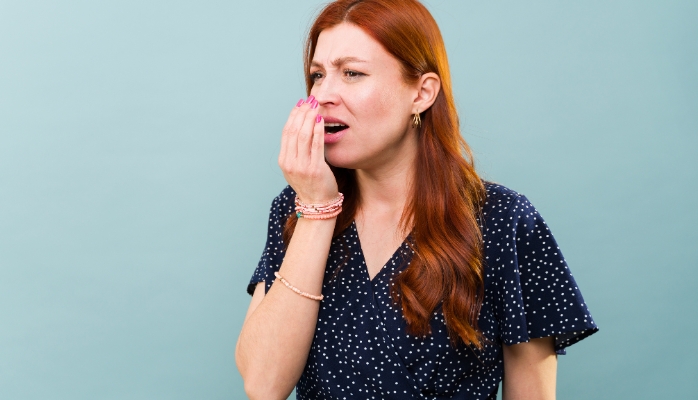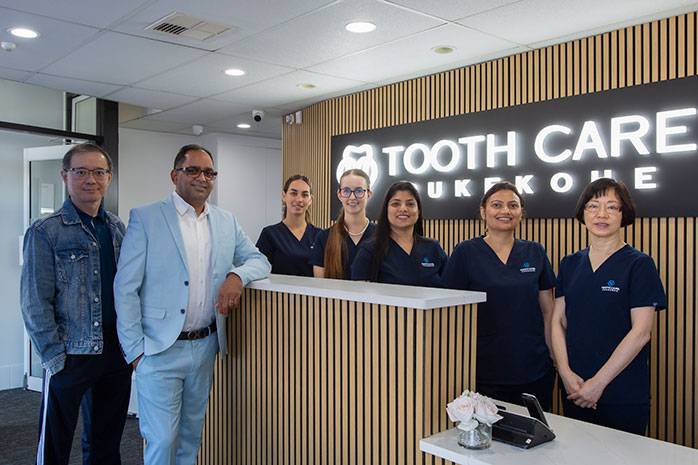Bad Breath
Bad Breath Treatment Pukekohe
Bad breath, medically known as halitosis, is a common yet often distressing condition that can affect your confidence and social interactions. While occasional bad breath is usually nothing to worry about, persistent halitosis may signal an underlying oral or systemic health issue that requires attention.
At Tooth Care Pukekohe, we understand the impact of bad breath on your overall well-being, and we are here to help you get to the root cause and offer effective solutions for fresher, healthier breath.
What is Halitosis?
Halitosis is the medical term for chronic bad breath that persists even after brushing or using mouthwash. While it can be an occasional problem caused by things like eating certain foods or drinking coffee or dehydration, persistent bad breath that could indicate oral health problems like gum disease or tooth decay, or even underlying systemic health conditions affecting your overall well-being. It’s not only a matter of personal comfort, but persistent bad breath can also affect social interactions and self-esteem.


What is Halitosis?
Halitosis is the medical term for chronic bad breath that persists even after brushing or using mouthwash. While it can be an occasional problem caused by things like eating certain foods or drinking coffee or dehydration, persistent bad breath that could indicate oral health problems like gum disease or tooth decay, or even underlying systemic health conditions affecting your overall well-being. It’s not only a matter of personal comfort, but persistent bad breath can also affect social interactions and self-esteem.
Common Causes of Bad Breath
1. Poor Oral Hygiene: The most common cause of bad breath is poor oral hygiene. When plaque and food particles remain on the teeth, gums, and tongue, they can lead to bacterial growth, which produces sulfur compounds that contribute to foul odors. Inadequate brushing and flossing allow this bacteria to thrive, leading to bad breath.
2. Gum Disease (Periodontal Disease): Gum disease, or periodontal disease, is a more serious cause of bad breath. This condition occurs when plaque and tartar build up on the teeth and gums, leading to inflammation, infection, and the release of foul-smelling gases. If left untreated, gum disease can lead to tooth loss and chronic bad breath.
3. Dry Mouth (Xerostomia): Saliva plays a crucial role in keeping your mouth clean by washing away food particles and bacteria. A dry mouth, often caused by medication, dehydration, or mouth breathing, can lead to bad breath because there is insufficient saliva to neutralize acids and eliminate bacteria.
4. Food and Beverages: Certain foods like garlic, onions, and spicy dishes can cause temporary bad breath due to their strong odours. After digestion, these foods release compounds that enter the bloodstream and are carried to the lungs, where they can affect breath. Coffee and alcohol can also contribute to dry mouth, which exacerbates bad breath.
5. Tobacco Use: Smoking or chewing tobacco products not only causes bad breath but also increases your risk of gum disease and other oral health problems that can contribute to halitosis.
6. Systemic Conditions: In some cases, bad breath can be a sign of a more serious health problem, such as respiratory infections (e.g., sinus infections or pneumonia), digestive disorders (e.g., acid reflux), diabetes, liver or kidney disease, or metabolic conditions. If bad breath is accompanied by other symptoms like a dry mouth, a metallic taste, or excessive thirst, it’s important to seek medical advice.
How to Treat and Prevent Bad Breath
1. Practice Good Oral Hygiene
- Brush your teeth at least twice a day using fluoride toothpaste to remove food particles and plaque.
- Floss daily to remove plaque and food debris between your teeth.
- Use a tongue scraper or gently brush your tongue to remove bacteria and food particles that contribute to bad breath.
- Replace your toothbrush every 3-4 months, or sooner if the bristles are frayed.
2. Visit Your Dentist Regularly: Regular dental check-ups and cleanings are essential to preventing and treating gum disease, tooth decay, and other oral health problems that can cause bad breath. Your dentist or dental hygienist can also help you identify if your bad breath is related to an underlying medical issue.
3. Stay Hydrated: Drink plenty of water throughout the day to keep your mouth moist and to help wash away bacteria and food particles. If you suffer from dry mouth, consider using saliva substitutes or sugar-free gum to stimulate saliva production.
4. Quit Smoking: If you smoke, quitting can significantly improve your breath, as well as your overall oral health. Smoking contributes to gum disease, tooth decay, and dry mouth—conditions that all contribute to halitosis.
5. Address Underlying Health Conditions: If your bad breath is linked to an underlying health issue, treating the root cause is essential. If you have a medical condition such as acid reflux, diabetes, or a respiratory infection, speak to your doctor for appropriate diagnosis and treatment.
6. Use Mouthwash or Rinse: A good mouthwash can temporarily mask bad breath and help kill bacteria in your mouth. Choose a mouthwash that is alcohol-free to avoid further drying out your mouth. Be sure to use mouthwash as part of your overall oral hygiene routine.

When to Seek Professional Help
If bad breath persists despite regular brushing, flossing, and using mouthwash, it may be time to consult with your dentist. Dentists are experts in identifying and treating the underlying causes of halitosis, including gum disease and other conditions that affect the supporting structures of your teeth. If gum disease or periodontal issues are contributing to your bad breath, we offer advanced treatments to address the root cause, restore your oral health, and help you enjoy fresh, confident breath once again.
At Tooth Care Pukekohe, we are dedicated to providing comprehensive periodontal care to help you achieve a healthier smile and fresher breath. If you’re concerned about persistent bad breath or have any other questions about your oral health, don’t hesitate to contact us for an appointment.